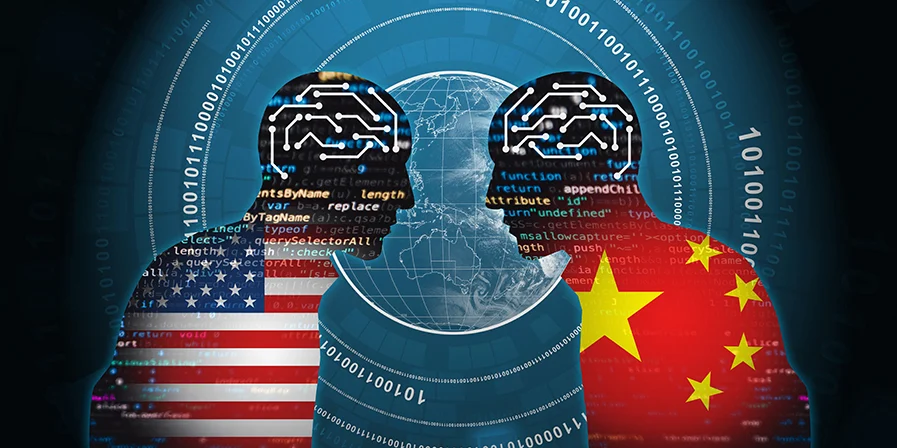A New Battlefield in the Trade War
For years, the trade war between the U.S. and China has escalated, with tariffs and economic sanctions as primary weapons. Now, China is shifting focus, targeting American tech companies with antitrust investigations. This strategic move aims to pressure U.S. policymakers by influencing key tech industry figures. However, this approach also presents risks that could impact China’s long-term economic stability.
China’s Antitrust Crackdown: Gaining Leverage
Beijing has launched antitrust probes into major U.S. tech firms like Nvidia and Google, with Apple, Broadcom, and Synopsys reportedly next in line. These investigations are a countermeasure against U.S. trade policies, particularly the tariffs imposed during former President Trump’s administration and continued under President Biden.
Shanghai-based tech policy expert Tom Nunlist describes this as a “chip-gathering exercise,” highlighting China’s intent to strengthen its bargaining position in trade negotiations.
Retaliation Against Google: A Huawei Connection
China’s grievances stem from past U.S. actions against its tech firms, particularly Huawei. In 2019, Google restricted Huawei’s access to its Android OS following U.S. sanctions. This forced Huawei to develop its own software ecosystem, significantly impacting its global competitiveness.
Now, China is retaliating by opening an antitrust investigation into Google. While officials frame it as regulatory enforcement, many view it as a strategic counterstrike in the broader U.S.-China tech conflict.
READ MORE: Overseas Pakistani Remittances Surge by 25% YoY, Reach $3 Billion in January 2025
Nvidia and the Semiconductor Showdown
The U.S. has tightened export controls on high-end AI chips, fearing their military applications in China. In response, China has initiated an antitrust probe into Nvidia, alleging discrimination against Chinese businesses. Given Nvidia’s critical role in global AI development, this move signals China’s willingness to challenge dominant U.S. tech firms.
Similarly, Broadcom’s $61 billion acquisition of VMware faced uncertainty until U.S. President Joe Biden and Chinese President Xi Jinping met in November 2023. Following their discussion, China conditionally approved the deal, requiring Broadcom to ensure continued supply to Chinese customers.
Apple Under Scrutiny: A New Front in the Battle
Apple, one of the most influential U.S. companies in China, is facing increased regulatory pressure. Chinese tech giants like Tencent and ByteDance have criticized Apple’s App Store fees, arguing they stifle competition. While Beijing had remained neutral, recent developments suggest a shift in stance, positioning Apple as a potential bargaining chip in trade disputes.
China’s Expanding Regulatory Arsenal
China has been strengthening its regulatory framework in recent years. In 2020, it introduced an “unreliable entity list” mirroring the U.S. list that restricted Huawei’s business with American firms. Additionally, in 2022, China enhanced its antitrust laws, granting regulators greater power to scrutinize corporate mergers and market behavior. These measures reinforce Beijing’s broader goal of exerting control over both domestic and foreign businesses operating in China.
Risks of China’s Strategy
While China’s aggressive approach may offer short-term leverage, it also presents economic risks. Unlike in Trump’s first term, American tech companies are now less inclined to advocate for China. Many firms have already begun diversifying their supply chains to reduce dependence on Chinese manufacturing, a trend that could accelerate if regulatory pressure intensifies.
Furthermore, China’s economy faces challenges such as slowing growth, a real estate crisis, and declining foreign investment. Escalating tensions with U.S. tech firms could discourage further investment, potentially undermining China’s long-term economic ambitions.
The Future of U.S.-China Tech Relations
The trade war between the U.S. and China shows no signs of abating. Both nations continue to leverage economic tools to gain an upper hand, with technology remaining central to the conflict.
China’s strategy of targeting American tech giants is a calculated gamble—one that may provide short-term negotiation leverage but could also drive businesses to seek alternatives outside China. As tensions persist, global businesses must navigate an increasingly uncertain landscape where political maneuvering plays a decisive role in shaping trade and innovation.




